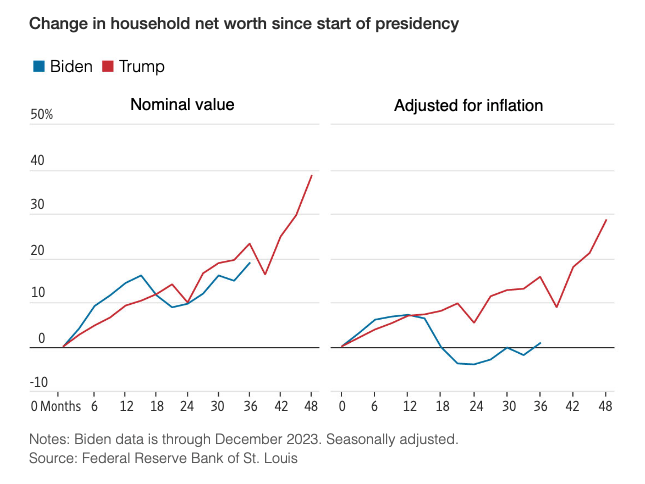
Donald Trump's campaign is clearing the way for Republicans to speak about how Americans suffer huge pocketbook damage from illegal migration.
The post Trump Campaign: Illegal Migrants ‘Attacking the Wages’ of Americans appeared first on Breitbart.
President Donald Trump’s campaign is clearing the way for Republicans to speak about how Americans are suffering huge pocketbook damage from the Democratic Party’s pro-migrant policies and the low wages those policies cause.
The populist attack on migration was buried deep in a Washington Post article touting the claimed benefits of Biden’s high-migration, low-wage economic policy:
In a statement, the Trump campaign said President Biden is “flooding America’s labor pool with millions of low-wage illegal migrants who are directly attacking the wages and opportunities of hard-working Americans.” Spokeswoman Karoline Leavitt said Biden’s policies of issuing migrants work permits while their requests for legal residency are pending “is especially devastating to African Americans, Hispanic Americans, and union workers who are forced to watch their jobs and public resources stolen by people who Joe Biden should never have allowed into our country.”
The statement is a populist door-opener for many Republican candidates and campaign committees who want to use kitchen-table pocketbook pitches to the many swing voters who prefer to downplay the chaos and crime of illegal migration.
So far, nearly all GOP candidates have avoided those populist pitches amid business support for the continued inflow of taxpayer-aided consumers, apartment-sharing renters, and wage-cutting workers.
The Trump campaign’s dollars-and-cents response was also a useful counterweight to the Washington Post‘s pro-migration article, which leaned heavily on academic debates instead of admitting the obvious pocketbook impact of Biden’s cheap-labor policy. The Post article began:
As Donald Trump touts increasingly aggressive plans to crack down on illegal immigration, economists are wary that his proposals would deal a massive blow to the U.S. job market, which has stayed strong thanks in part to foreign-born workers.
The Post article then slid into a professor vs. professor dispute that hid the painful pocketbook reality of Biden’s high-migration economy:
Some academic research does show that a rise in immigration drags down wages and job opportunities for all workers. For example, Harvard economist George Borjas has found that a 10 percent increase in the number of immigrants within a particular group probably lowers that group’s wage by 3 to 4 percent, which can particularly affect workers with lower levels of education. But his work also found that lower wages can bring higher profits for an employer, with those added gains ultimately growing the economy for native workers.
The article cited Michael Clemens, “an economist specializing in international migration at George Mason University,” who contended that a migrant, whether illegal or not, working in the kitchen of a restaurant complements an American citizen “serving a table,” and that each of those employees depended on the other for their job.
Still, some reporters at other media outlets are making the damage clear. For example, the Wall Street Journal reported on May 17: “Adjusted for inflation, net worth was up just 0.7% through Biden’s first three years, compared with 16% through Trump’s first three years.”

Wall Street Joural chart of household net worth (wsj.com)
Other reporters describe migration’s massive economic and civic damage to the United Kingdom, Canada, and Australia.
But most reporters perfume the grinding economic exploitation enabled by the federal government’s migration policies. The Financial Times, for example, reported from New York on May 21:
When Silvana arrived in New York with her husband and daughter after a nearly two-month journey from Ecuador through the jungle, she immediately started looking for a job.
…
Silvana now sells plates of rice and soup out of a white cooler outside the shelter where she lives, earning $60 for four hours of work each day.
Silvana’s wage adds up to $300 per week, or $15,000 per year, ensuring her complete reliance on welfare and aid from the state’s taxpayers. Her willingness to work for a pittance also drags down the wages earned by other illegals, migrants, and American citizens, thus expanding the demand for welfare and aid programs.
But the Financial Times prefers to focus on the concerns and desires of employers, contending, “New York’s hospitality industry ‘absolutely still needs labour,’ said Andrew Rigie, executive director of the NYC Hospitality Alliance, a trade group for the city’s restaurants and bars.”
Extraction Migration
Since at least 1990, the federal government has relied on Extraction Migration to grow the consumer economy after it helped investors move the high-wage manufacturing sector to lower-wage countries.
The migration policy extracts vast amounts of human resources from needy countries. The additional workers, consumers, and renters push up stock values by shrinking Americans’ wages, subsidizing low-productivity companies, boosting rents, and spiking real estate prices.
The economic policy has pushed many native-born Americans out of careers in a wide variety of business sectors, reduced Americans’ productivity and political clout, slowed high-tech innovation, shrunk trade, crippled civic solidarity, and incentivized government officials and progressives to ignore the rising death rate of discarded, low-status Americans.
The policy also sucks jobs and wealth from heartland states by subsidizing coastal investors and government agencies with a flood of low-wage workers, high-occupancy renters, and government-aided consumers. Similar policies have damaged citizens and economies in Canada and the United Kingdom.
The colonialism-like policy has damaged small nations and has killed hundreds of Americans and thousands of migrants, including many on the taxpayer-funded jungle trail through the Darien Gap in Panama.





